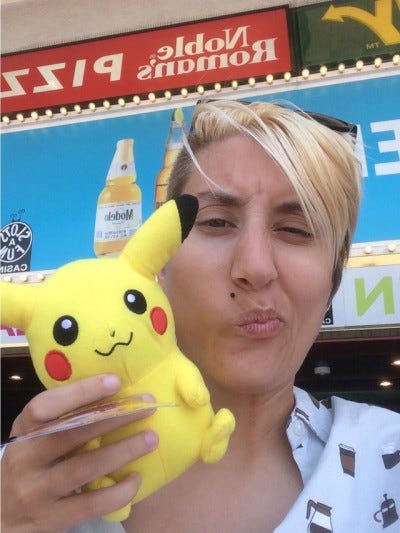The IUD Chronicles, Part 2: Expectations
I have spent the past 11 years with a glut of hormones in my body. What’s gonna happen when I return to my natural hormone levels?
I have spent the past 11 years with a glut of hormones in my body. What’s gonna happen when I return to my natural hormone levels?
As I wrote in my last entry, I have decided to switch from hormonal birth control to a copper IUD largely because of concerns about the effect hormones have on my emotional state. I have always been a highly functional person, even in the wake of trauma and while experiencing intense depression, but I’ve gotten very, very sick of being sad and frantic every four weeks. So as I make the switch over to a copper, no-hormones-added IUD, my highest and expectation is that I will have an improved mood, more stable and manageable emotions, and less intense crying jags.
(Crying I am fine with. I love crying at the beauty of a plump squirrel or two friends loving each other or the ending credits of Wall-E. That is no problem. I just don’t want to be sent into a torrent of late-night, desperately lonely tears every third week of my birth control pack).
I’ve been reading up on IUD’s, and the side effects of hormonal birth control, and what to expect as I switch from one to the other. I was also given a very detailed review of what to expect by my doctor today. A lot of the changes that I anticipate are things I’m looking forward to: slightly smaller boobs, a clearer head, no contraceptive expenses for twelve years, and so. However, I am a realist-pessimist and an anxious person who always keeps an array of contingency plans in the back of my head, so I have anticipated a fair number of negatives as well. Here they are, good things first:
The Good:
More stable moods. On hormonal birth control, my moods vary in intensity, depending on the week of pills I’m on. On Week 1 (a mild-ish hormone dose), I am productive and busy, with a bright attitude and a pretty resilient disposition. I feel somewhat outgoing, full of agency, and whip-smart. I love how I am that week. On Week 2, I am a bit more bloated and I get sad or frustrated quite a bit easier. Week 3 of my birth control pills is Hell Week — the hormones are at their peak, and after five or six days of doses I am anxious, lonesome, insecure, and sad.
I cry a lot on the tail end of Hell Week. I cannot bounce back from annoyances, slights, or disappointments. My pain and isolation seems unending; my unloveability is a simple fact. Week 4 is placebo week, and my mood returns to stability. I bleed and I am content.
Off of birth control, I expect that my mood will be closer to that of Week 4 or Week 1 than it is to Hell Week. Hormones do fluctuate naturally as part of the natural menstrual cycle, so I’m sure I will still have times of greater or lesser rage and greater or lesser sorrow. However, I don’t remember my moods ever being overpoweringly negative prior to starting birth control, and many people report an improvement in mood after ceasing to take them. My hope is that I will feel much more satisfied with my life, love myself more easily, and slip less frequently into a shame-and-sorrow spiral.
Smaller boobs. My boobs definitely got bigger when I started birth control. They went from a C to a D cup in the first year. As my body has continually been bathed in added hormones over the ensuing ten years, they’ve gotten steadily larger. Now they’re DDD, and they’re a pain, especially for a wannabe-androgynous enby like me. Having big boobs on a small frame is a logistical pain and a real drag on my posture. It doesn’t help my gender dysphoria at all either.
My chest size does fluctuate with my hormones, with them being largest and most painful during — you guessed it — Hell Week. My boobs get sore and feel incredibly round and “full” (ugh) during that time. During the lower-hormone Week 1 and the no-extra-hormones Week 4, my chest feels smaller, and, for want of a better descriptor, more “loose”. There’s less tissue in there. The boobs are softer and less sensitive; they look smaller, fit in my bras and clothing better, look less preposterous on me, and feel less like over-filled implants. I anticipate my chest will generally be smaller and looser off of hormones. For many people that appears to be the case.
(Yes, I’m aware that lots of people covet large, buxom, round, perky boobs. Whatever. I hope those people get them. I’m nonbinary and I don’t want big round globules on my chest. I want something that feels a bit more lived-in and less massive. If you want implants or want the big, round look, go for it. I celebrate that.)
No birth control expenses and fewer pap smears. On hormonal birth control, I’ve had to pay between $100 — $24 a month for medication, depending on the insurer I had at the time (Fuck you, Loyola University Chicago, for using the institution’s Jesuit background as an excuse not to pay for employees’ birth control). To get a prescription, I’ve had to endure an annual gynecological exam, which has cost between $60–120 a year, depending on the insurer and where I was working (Fuck you, Loyola University Wellness Center, for not giving your graduate students contraceptive prescriptions, again due to the school’s Jesuit background).
This past year, I avoided an annual exam and instead relied on the app Lemonaid Health to get my birth control prescriptions. It’s a convenient option if you don’t have health insurance or don’t want to go to a gyno for other reasons. The way it works is simple: You fill out a request with your name, height, weight, smoking habits, and blood pressure, upload a photo of your face to confirm your identity, pay the service fee (originally $15, now $25), and within 24 hours a doctor with the service writes you a 3-month prescription for the birth control pills of your choosing. Then you get that prescription filled at your pharmacy (and pay for the pills). I’ve done this every three months, all year long, and it has helped me maintain access to BC very easily even when my insurance lapsed.
Getting a copper IUD will spare me the hassle and cost of all this. There are far more expensive medications to need & more challenging medical situations to be in, it’s true, but I’m still looking forward to saving the money and time by switching to a non-hormonal method that will last me 12 fucking years. And as someone who gets pretty uncomfortable at the prospect of a pap smear, I relish not having to subject myself to one as frequently.
Diminished breast cancer risk. Hormonal birth control pills increase your risk of breast cancer. However, the pills lower your risk of developing cervical cancer, so in many people’s estimation, it’s a wash. I’m not sure if statistically the two risk factors actually balance out, though. At any rate, after 10+ years of being on hormones, getting off them and reducing my breast cancer risk is a good idea.
Diminished risk of blood clots. Another big risk of hormonal birth control is that it raises your odds of suffering a blood clot. This risk scared me a lot when I first started taking BC. I was always jiggling my legs and taking long walks to avoid getting one. I don’t worry about it much anymore, but the fact remains that anybody who is sedentary for much of the day should be careful about their risk. This is doubly true if you consume nicotine. I work a desk job and I sometimes vape (embarrassingly), so getting off a medication that poses a blood-clot risk is a good idea.
Increased libido. I never noticed that going on BC dampened my sex drive, but most people report a decline after starting the pills, and the research backs them up. Many people who go off hormonal birth control also report a sharp uptick in their desire for sex. I have every reason to expect that for me, too.
I’m not 100% sure this one will be a positive for me; my sex drive is already fine. I don’t want to be so horny that it gets in the way of getting shit done. There is also research suggesting that hormonal birth control influences who a person finds attractive and what kinds of sex they like to have…so I’m curious to see how my desires will shift once I’m off the pills. The prospect is kind of exciting.
Reduced gender dysphoria. As a nonbinary / maybe transmasculine person who was assigned female at birth, being on birth control has been like being on reverse-hormone replacement therapy for years. My body and brain have been flooded with extra estrogen when ideally, I’d like my levels of estrogen and testosterone to be balanced. High levels of estrogen feel wrong for me. High-estrogen days emotionally plague me. Those hormones change my body in stereotypically “feminine” ways and make me feel just, off.
I believe I’ll feel more at ease when my hormone levels are natural. I remember feeling more confident and more comfortable in my own skin as a teenager, before starting hormonal birth control. I didn’t feel “womanly” and felt no pressure to comport myself in a “womanly” way. My body did not feel too “feminine” and my moods were pretty even-keeled. I didn’t know I was nonbinary back then, not in those terms, but I felt like I was a distinct “other”, and I felt comfortable in my other-ness, even if other people couldn’t see it yet. I look forward being free of hormonal tampering and excess estrogen. I can’t wait to see how I actually feel, emote, and think without all that.
Those are the salient positives I anticipate. Now let’s hear…
The Bad:
More bleeding. Like way more. Birth control pills reduced the intensity of my periods. That is indisputable. The flow lessened. The duration of the period diminished. Cramps to nearly nothing. I never had horrible periods, but I still very much appreciated having less flow. It made life easy.
Going off hormonal BC, I am all but guaranteed a heavier, longer, more painful period. All the research and everyone’s anecdotes are consistent on this. In fact, it’s the single most consistent finding people have about making the switch from BC pills to a copper IUD. There will be more blood. There will be spotting on non-period days, and irregular periods that come early and last long. The volume of blood will be much larger. The cramps will be more intense. There will be soiled underwear and late-night dashes from the bed to the bathroom.
This is particularly worrisome because I have a history of anemia. However, I am informed, and prepared, and have every intention of riding this thing out with maxi pads, iron supplements, exercise, pain medication, and patience. Most accounts suggest that the increased bleeding will stabilize, then abate, after six months. After that, periods become far more manageable and regular.
More acne. I had what I believed to be unsightly acne as a teen. Looking back at photographs, I think I had a few big spots but nothing severe. Still, I remember the shame and obsessiveness that attended my acne. I stared at my pimples for hours, checked them constantly for growth and shrinkage, pushed at them, popped them, picked them, tried to “open them up” with hot compresses, tried to cover them up with layers of makeup, tried to burn them off with salicylic acid and benzoyl peroxide and toothpaste.
This feverish routine left me with hyper-pigmented scars, dry skin that flaked off in big strips, and the desire to hide behind a curtain of hair. Oh, and acne. I still had that. On my face, my ass, and my back. None of my obsessive attempts at acne management made much of a dent on the pimples themselves.
Over the years, the acne up and disappeared. I still get a big red welt once a month or so, but it doesn’t bother me, and I don’t have to do anything to manage it or to prevent breakouts. I’m not sure if birth control made a difference or if my acne went away as a product of age, but I imagine I’ll see a resurgence when my hormonal birth control runs out. Hormones influence acne quite a bit — everyone I know who takes estrogen as HRT reports clearer skin as a result; everyone who takes testosterone sees a fresh crop of pimples at first. By reducing my estrogen-to-testosterone ratio, I imagine I’ll briefly see a flare-up, a return to long-gone, teenage days. I plan to improve my skin care regimen in response, and will try to wait it out.
Pain. Getting an IUD hurts. Depending on who you ask, it either feels like a bad menstrual cramp or like going into intense labor contractions. There’s no avoiding it. It will hurt. And periods themselves will hurt quite a bit more too, for months to come. That’s if everything goes according to plan. If there’s an accident and the IUD perforates the back of my uterus, well, then there will be a fucking LOT of pain. Let’s hope not.
Sexual complications. An IUD is placed beyond the cervix, near the uterus. Two strings trail off the device, through the cervix and into the vagina. These strings allow for the placement of the IUD to be checked, and make removal of the IUD easier. At first, these strings feel quite stiff. They’ve been known to jab partners in the dick. Over time the strings soften, but they can be unweildy at first. Also, I once read an XoJane article about a man’s dick getting impaled by an IUD and then accidentally pulling it out of the woman’s body. I can’t stop thinking about it. It’s a remote but real possibility.
I’m worried that the IUD could affect my sex life in other averse ways. Will it make sex painful for me? Will I not be able to have sex that’s as rough or fast, lest I feel the device getting smacked around inside me? Will the pain of insertion leave me unwilling or unable to enjoy sex for weeks? What if it falls out during sex? These things happen. They are rare events, but real ones. Even the increased bleeding that comes as a matter of course could, in theory, make my sex life more difficult. I would hate it if my attempt at care-free sexual liberation resulted in me being sexually incapacitated for an extended period.
The Worst-Case Scenario:
Since a copper IUD is an inert, drug-free piece of metal that just sits inside your body for a decade or more, it’s relatively harmless. However, there are people who experience jabbing pain, perforation of the uterus, infections at the insertion site, pain during sex, unceasing bleeding, fevers, or freak-occurrence pregnancies.
I worry, because how could I not, that I will spend a lot of money on the insertion of this device, experience debilitating pain, develop prominent cystic acne, and find myself unable to have sex for months…only to give up three months in and have the damn thing removed. I don’t want to have to return to BC pills after all this, tail between my legs (or IUD strings between my labia lips) in shame.
But. That probably won’t happen. More likely…
The Realistic Scenario:
I will experience some pain for a few days following insertion. I will wear maxi pads and bleed for a bit, then return to some semblance of a menstrual cycle. I’ll spoil a few underwears with unexpected bleeding, but with a little care and a lot of iron pills and some pain-relief patches, I will endure. Some new pimples will announce themselves on my forehead and chin. I’ll buy a new face wash, the kind I used as a teenager, and the pimpies will go down.
I’ll feel good, emotionally, but in that subtle kind of way that signals true recovery, not the fireworks-and-singing-in-the-grocery-store sort of euphoria that does not last. I will still be sad sometimes. But I’ll be better. After six months or so, the periods will get calmer and the acne will clear up. I won’t get pregnant. During sex ,things will feel pretty much normal, unless I’m doing some ankles-behind-my-head, deep-plunging penetration, in which case I might be reminded of my new copper friend. I will have my friend removed, and likely replaced with a new buddy that is even better, in January of 2030.
That’s the hope. We’ll see how it actually goes very soon.
— — — —
This piece is part of an ongoing series about my transition from hormonal birth control pills to a copper IUD. You can read the first entry here. My next entry in the series reviews the process of getting the IUD inserted at my local Planned Parenthood.








